TODAY’S READING FROM THE OLD TESTAMENT- LAMENTATIONS 1:1-2:19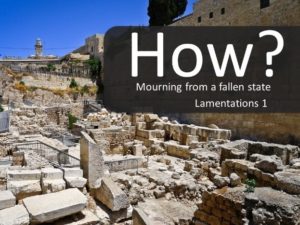
The first words of chapters 1, 2, and 4 are “How?”
It is a word of astonishing grief. The question is asked: How did this happen? How widespread is this disaster? How long will we bear this judgment?
“How lonely sits the city that was once full of people!” (1:1) “How the Lord has covered the daughter of Zion with a cloud of His anger!” (2:1) How dark the gold has become, how the pure gold has changed! The sacred stones are poured out at the corner of every street”. (4:1)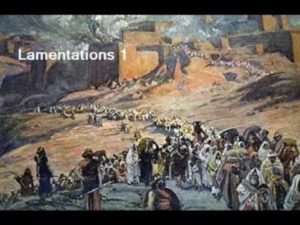
Today we start reading the Book of Lamentations. It is hardly the most popular book in the Bible, but it contains an essential component- an expression of grief over sin and its consequence. We are given a picture of the wrath of God against sin, and the necessary chastening that God gives His own with the intention of restoring them to fellowship.
The Book is made up of 5 “Lament Poems” of 22 verses each, concerning the fall of Jerusalem. Each verse in Chapters 1,2, and 4 begins with the successive letter of the Hebrew alphabet. Chapter 3 does the same, but is three times longer, having three verses beginning with each letter instead of one. The final chapter abandons that ordered style.
Each poem expresses pain and sorrow over the fall of Jerusalem and the failure of God’s people to follow His ways. They also express an acceptance of God’s punishment for their disobedience to His Word.
The Book of Lamentations is one of the five Megillot (Scrolls) and is read on the ninth day of Av- Tish B’av (a day of mourning that takes place in August commemorating the destruction of Jerusalem and Solomon’s temple).
Throughout history there have been poems that have lamented the spiritual malaise and damage that have come upon the people of God.
These are songs of sorrow, written by an anonymous author, lamenting the destruction of Jerusalem. The city has been destroyed, the temple burned, the articles confiscated, and the people taken captive to Babylon. Once again Jeremiah is the weeping prophet. He weeps because God has rejected His people due to their rebellion. He weeps because they did not repent and turn to God when called to do so, but stubbornly continued in their sin.
The first verses (verses 1-11a) are written from the vantage point of the onlooker. Verses 11b to 22 are written from the vantage point of the city personified.
Lamentations 1:11b- “See, O LORD, and look, For I am despised.” 12 “Is it nothing to all you who pass this way? Look and see if there is any pain like my pain which was severely dealt out to me, which the LORD inflicted on the day of His fierce anger.”
TODAY’S READING FROM THE NEW TESTAMENT – PHILEMON 1:1-25
Philemon’s runaway slave, Onesimus, (the name means ‘useful’), has been converted in Rome and become a trusted friend of the Apostle Paul. Paul wants Onesimus to return to his master Philemon in Colossae and put things right. In this letter, Paul appeals to Philemon, asking him to receive Onesimus as he would receive the apostle Paul himself and put any debt Onesimus may owe him, on Paul’s own account.
Notice Paul’s prayer request– -He reminds Philemon that the fellowship he has with the Lord must now be extended towards the repentant Onesimus, who is now an ‘in Christ’ one. He challenges Philemon to live out the gospel and to forgive Onesimus as he has been forgiven by the Lord. Onesimus (lit. ‘Useful’) may have proved to be useless to Philemon in the past, but now as a new creation, he has proved himself to be true to his name- useful to the apostle Paul and would surely be to be useful to Philemon.
Philemon 1:10-25 9 10 I appeal to you for my child Onesimus, whom I have begotten in my imprisonment, 11 who formerly was useless to you, but now is useful both to you and to me. .17 If then you regard me a partner, accept him as you would me. 18 But if he has wronged you in any way or owes you anything, charge that to my account; 19 I, Paul, am writing this with my own hand, I will repay it (not to mention to you that you owe to me even your own self as well).
TODAY’S READING FROM THE BOOK OF PSALMS – PSALMS 101:1-8
This is the Psalm of a ruler, attributed to David.
Verses 1-4 record the ruler’s decisions concerning himself: I like his resolve:
Psalm 101:3 3 I will set no worthless thing before my eyes; I hate the work of those who fall away; It shall not fasten its grip on me.
One paraphrase version says, “I will not look upon anything vile or vulgar.”
Psalm 101:4 4 A perverse heart shall depart from me; I will know no evil.
The second section, (verses 5-8) record his decisions concerning the administration of his kingdom. Whom will he have serve with him in his administration? He will not tolerate the slanderous or the haughty. He will look upon the faithful of the land, and those whose walk is blameless.
Choose good companions!
TODAY’S READING FROM THE BOOK OF PROVERBS – PROVERBS 26:20
Proverbs 26:20 20 For lack of wood the fire goes out, and where there is no whisperer, contention quiets down.
Don’t feed the gossip fire. Don’t even listen to it. Stop it. Ask the person who is speaking about another, if they have gone to that person, they are talking about in a spirit of meekness to speak directly to them. Ask if you can quote them to the one he or she is gossiping about. Put out the fire of gossip before it damages many relationships.
PRAY FOR THE NATIONS- Somalia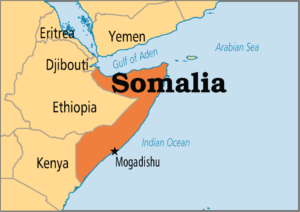
Somalia
Soomaaliya
Africa
Geography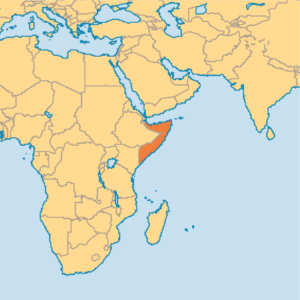
Area: 637,000 sq. km
The mostly arid Horn of Africa east of Ethiopia and Kenya.
Population: 9,358,602 Annual Growth: 2.30%
Capital: Mogadishu
Urbanites: 37.4%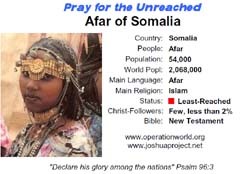
Peoples
The images of Somalia are heart-breaking in this video. Pray with our brothers and sisters in a country where human brokenness is so evident.
https://www.youtube.com/watch?v=V85EjJHUEgE
Peoples: 22 (77% unreached) All peoples
Unreached Peoples Prayer Card
Official language: Somali, Arabic (few speak it) Languages: 15 All languages
Religion
Largest Religion: Muslim
| Religion | Pop % | Ann Gr | |
| Christians | 30,883 | 0.33 | -1.1 |
| Evangelicals | 4,263 | 0.0 | 8.1 |
| Muslim | 9,327,719 | 99.67 |
Answer to Prayer
An infant Somali Church is emerging amid great tribulation. Somali Christians are despised and heavily persecuted, even martyred, but are also growing in faith and in vision. Burdened for their country, they are leading more boldly and will clearly not just disappear. Those in power admit that Somalis are no longer 100% Muslim but more stridently insist that all Somalis remain Muslim.
Challenge for Prayer
The work of missions, always dangerous and hedged with restrictions, was forced to cease in 1972 when their institutions were nationalized by the new Marxist regime. The work of different missions between 1897 and 1974 saw several hundred turn to the Lord. Pray for workers to the Somalis to be called, committed and ready for when these defiantly closed doors open.
Sunni Islam is the official religion of the unstable nation of Somalia. With no established permanent government, Somalia functions under the temporary leadership of the Union of Islamic Courts, which serves as a transitional authority. The East African nation, located on the Gulf of Aden and the Indian Ocean, is susceptible to droughts and dust storms in the summer and floods during the rainy season. Somalia has the seventh highest birth rate in the world, accompanied by the second highest maternal mortality rate, and fourth highest infant mortality rate. The decades-long instability has also led to a 38% literacy rate, and almost one third of children are underweight.
Northern Somalia, called Somaliland, has remained stable since their independence from Britain in 1991. The southern part of Somalia, called Puntland, has been overrun with civil war, violence, and clan leaders craving power. Consequently, the Union of Islamic Courts has implemented Shari’a law, creating a mixed legal system specific to Somalia of civil, Shari’a, and other customary laws, known as Xeer. Surprisingly, Somalia has a stable economy that depends largely on livestock; nearly two thirds of people in Somalia are livestock herders.
There are 22 people groups in Somalia, 16 of which have never heard the gospel. The vast majority of those living in Somalia are Sunni Muslim and still practice traditions such as female circumcision. Islamic fundamentalists have vowed to eliminate all Christians in Somalia, and murders of Christians are becoming more common. There are currently about 4,000 believers in Somalia who mainly worship in house churches to keep their fellowship a secret. However, as the persecution of Christians heightens so does the boldness of the believers. Most missionary efforts were forced to stop in 1972 as a result of a brief dictatorship. Pray that more missionaries would be called to work among these people.
PRAYER: Lord, there are times we lament for the condition of our own hearts, and the spiritual declension and moral decay of our society. We confess our failures to walk in Your ways and ask that You would cleanse us from our sin and renew a right spirit in us. Cause us to walk in Your statutes with obedient hearts. May we extend to others the love, the grace, the forgiveness and the truth that we have received. In Jesus’ Name. Amen.
